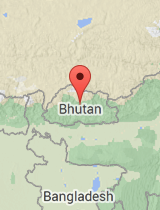Medical Summary
The health risk information presented here is summarized from Shoreland Travax®, a decision-support tool used by health care providers to perform a detailed health risk analysis based on specific locations, individual travel styles, and traveler risk behaviors. Travax provides practitioners current, independently researched malaria risk and prevention recommendations in a map-based format that goes beyond the annual WHO and US CDC statements included here. Not included here are current reports from Travax of disease outbreaks or environmental events that may pose elevated risks to travelers’ health and safety. The Providers section of this site offers a directory of health care providers who utilize Shoreland Travax for travel health counseling. Learn more about the detailed reports and maps available from these practitioners (includes links to samples).
General Information
Bhutan is a developing nation classified as lower middle income. Located in southern Asia (east of India and south of China), the climate is classified as dry summer in the south, with cooler temperatures in some high-altitude areas (in the north).
Vaccinations
Routine vaccinations are essential due to a persistent global rise of vaccine-preventable diseases (especially markedly high rates of diphtheria, pertussis, and measles). Prior to travel, travelers should be up-to-date with the age-appropriate and risk-based routine vaccinations recommended by their home country, which may include:
- COVID-19
- H. influenzae type B (Hib)
- Hepatitis A
- Hepatitis B: Protection is especially important for those at increased risk.
- Herpes zoster
- Human papillomavirus
- Influenza
- Measles, mumps, rubella: A single early dose is recommended for travelers aged 6-11 months.
- Meningococcal
- Pneumococcal
- Polio
- Rotavirus
- Tetanus, diphtheria, pertussis: Tdap preferred; consider an early pertussis booster for high-risk travelers.
- Varicella
Depending on your itinerary, your personal risk factors, and the length of your visit, your health care provider may offer you vaccination against chikungunya, dengue, Japanese encephalitis, rabies, or typhoid fever.
Malaria
See also: Library article for Malaria
The following is current information as reported by the World Health Organization (WHO) and the US Centers for Disease Control (CDC):
WHO—International Travel and Health (current online update, Country List)
(2022) malaria risk exists throughout the year in the southern belt of the country, which comprises seven districts: Chukha, Dagana, Pemagatshel, Samdrup Jongkhar, Samtse, Sarpang and Zhemgang. No transmission occurs in the four following districts: Bumthang, Gasa, Paro and Thimphu. Seasonal transmission during the rainy summer months occurs in focal areas in the rest of the country.- Recommended prevention in risk areas and seasons: C – Risk of P. falciparum malaria. Mosquito-bite prevention plus atovaquone-proguanil or doxycycline or mefloquine chemoprophylaxis (select according to drug-resistance pattern, reported side-effects and contraindications).a, b
aAlternatively, for travel to rural areas with low risk of malaria infection, mosquito bite prevention can be combined with stand–by emergency treatment (SBET).
bIn certain areas with multidrug-resistant malaria, mefloquine chemoprophylaxis is no longer recommended. At present, these areas include Cambodia, south-eastern Myanmar and Thailand.
WHO Country List footnote: When available, the date of the most recent update or confirmation is indicated in parentheses in the country list. If no accurate date is indicated, the most recent update or confirmation was provided prior to 2013.
CDC—Health Information for International Travel (current online edition)
Transmission areas
- Rare cases in rural areas < 1,700 m (< 5,500 ft) elevation in districts along the southern border shared with India
Drug resistance1
- Chloroquine
Species
- P. vivax (primarily)
- P. falciparum (less commonly)
Recommended chemoprophylaxis
- None (insect bite precautions and mosquito avoidance only)4
1 Refers to P. falciparum malaria, unless otherwise noted.
4 Mosquito avoidance includes applying topical mosquito repellant, sleeping under an insecticide-treated mosquito net, and wearing protective clothing (e.g., long pants and socks, long-sleeve shirt). For additional details on insect bite precautions, see Mosquitoes, Ticks, and Other Arthropods chapter.
Other Concerns
Travelers' Diarrhea
See also: Library article for Travelers' Diarrhea
High risk exists throughout the country, with moderate risk in deluxe accommodations. Community sanitation and food safety measures are generally inadequate. Some itineraries (e.g., remote destinations, austere accommodations) and activities (e.g., ecotourism, eating street or local-market food) further increase risk.
Travelers should observe food and beverage precautions, which reduce the likelihood of illness.
Travelers should carry loperamide for self-treatment of diarrhea and, if risk is moderate to high, an antibiotic to add if diarrhea is severe. Consult a knowledgeable health care provider regarding which antibiotic is appropriate for you and most effective for your destination.
Other Food-Borne Illnesses
Precautions to prevent brucellosis may be needed.
Insect- and Arthropod-Borne Diseases
Leishmaniasis may pose a risk. Personal protective measures are important.
Other Disease and Health Risks
Additional concerns include air pollution, altitude illness, anthrax disease, Crimean-Congo hemorrhagic fever, helminths, leptospirosis, plague, sexually transmitted infections, snakebites, tuberculosis.
Safety and Security
See also: Library article for Safety and Security
Key Safety Risks
- Road conditions
- Stray dogs
- Natural disasters
Emergency Contacts
The police emergency number is 113.

